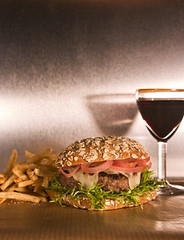 Image via Wikipedia
Image via WikipediaAs children, we were lined up at school for dental inspection followed inevitably in my case by dental action. I still think it was unfair...I didn't have many sweets and brushed away morning and evening but my teeth always seemed to need something doing to them. I don't know where these dentists had been trained, but in my view they were part of war reparations....Gestapo torturers handed over by the Germans to harden the children of Britain in interrogation resistance techniques.
Well, I resisted pretty well, but the last straw was a bald man who said he wasn't going to hurt me and then did. A literal child, betrayed, I bit him and was excluded for the future from the line up in the corridor.
In later life, I had super dentists but dashing and kind as they were they could arouse no frisson of pleasant anticipation in me as I sat in their waiting rooms surrounded by posters of teeth. Bald men don't either, so the school dental service has a great deal for which to answer.
Some months after moving to rural France, I had a toothache which oil of cloves would not touch, so I needed the dentist. Papy told me that there was no need to make an appointment, just to go down to the surgery in the village and sit in the waiting room, so that was what I did.
Two gloomy gentlemen were already in occupation - for some reason the usual round of handshakes doesn't take place in dental waiting rooms - and one informed me that the dentist was out but would be back shortly. I passed the time looking at posters of teeth.
The dentist returned. The street door banged against the wall, there was a strong smell of drink having been taken and a tall handsome man with black curly hair strode in.....his white coat liberally splashed with blood.
'Sorry to keep you waiting, but I had a spot of bother just now...Come on Jules, let's get these false teeth sorted!'
I think I was rooted to the chair in shock...otherwise I would have fled.
Georges, the other patient, turned to me.
'Don't worry, he had a problem taking a tooth out...it broke and he had to put his knee on Jean-Paul's chest to get the leverage to get the last bit out. Bit of a shock for both of them, so they've just been over to the bar for a restorative.'
Don't worry! What, I wondered would qualify as something to worry about? A broken artery, dislocated jawbone....If the tooth hadn't been giving me such gyp I would have been away in Olympic record time for the one hundred yard dash - or whatever it is in metric. But it was so I didn't.
Dentists have an unfair advantage. They stick needles in your gums so that your lips turn to wood and then make you keep your mouth open while they talk to you. You have no way of responding.
This dentist talked to me while finding and dealing with my problem tooth.
I was new to the commune. I was British. This was very convenient. He ran the amateur dramatic society. He had decided to put on a Feydeau farce. There was an English governess in it and none of his regular actresses could say 'shocking!' properly. So there it was. First rehearsal on Tuesday evening in the mairie annexe at eight o' clock.
He had a copy of the play in my hand, my role marked in pencil, before I could mumble a word.
Shocking!
So here I was, my French far from fluent, with no experience of amateur dramatics since being in the chorus of 'The Mikado' while at school, being propelled onto the boards by a dictatorial dentist.
I studied the part...small, luckily....and the cues. I turned up at the annexe to the mairie and found I already knew some of the people there. Then the dentist arrived and things took off. He was a ball of energy and enthusiasm, a perfectionist and, inevitably, not only director but also leading man.
Like everyone else, I was pushed and pulled into place, was prompted and scolded and learnt an enormous amount about staging farce.
Timing, timing and timing, keeping the action going, getting his actors to have a signature expression or tone of voice that marked them clearly for the audience, he was dedicated to getting his crew to give of their best.
It was all very convivial...there was always wine and cake at the end of the rehearsal, and I was included in the cake rota automatically which surprised me given the French suspicion of anything emerging from a British oven. I supplied treacle tart and to my relief it was asked for again.
I got to know people...my French improved dramatically...and I learned a lot about the commune as we worked.
Although amateur dramatics - like music - had always had a strong following in the area, until fairly recently these activities had been duplicated. Those who attended mass - known as the frogs in the holy water stoup to those who didn't - supported the priest's theatre group and band and the others supported the republican groups.
In that village, the war between state and church had been such that - Clochemerle like - the public toilets had been set up next to the church on the main square......and were closed on Sundays! Respect for the church or a strong determination that believers shouldn't be able to use the facilities?
The play was performed on the home ground first, in the salle des fetes and then toured neighbouring villages, always to packed houses and vigorous applause, two nights and a matinee a week for four weeks, the cast kept going by buckets of mulled wine backstage, dished out in an enamel mug.
It was fun, and I gladly joined up for several more years. It was always a Feydeau farce, there was always a place for a foreigner and in year two I even graduated to my own little round of applause as I entered, an accolade awarded by audiences to the regular players.
But things were changing.
When I first moved to France, nearly every village had its' doctor and dentist, but as they retired, no one came to take their place. Restricted entry to dental schools meant that young dentists gravitated to the towns, young doctors likewise. The country, where nothing moved after five o'clock in the evening, had no allure for these people, who could now pick and choose where to set up in practice.
It is far worse now. When my dentist retires, the nearest will be twenty kilometres further away and his lists are already full to breaking point. In an emergency, it can be necessary to travel to the nearest university dental hospital if the town dentists can't take you.
When the local doctor moved to town, no one wanted to take on his practice until the maire looked around and found a Spanish doctor who wanted a quiet life for his young family and was willing to come. He is a wonderful doctor, but French beaurocracy has driven him to the end of his tether and he is talking of returning to Spain.(!) If he goes, the maire will have to get his seven league boots on again, as the ageing population needs a doctor close to hand.
Our dentist did not retire, but he left all the same. The lady from the chateau, whose cavities he had been assiduously attending to for some years, decided that enough was enough. She left her husband and, with the dentist in tow, moved to that Sodom and Gomorrah of the Atlantic coast, La Baule.
Shocking!
![Reblog this post [with Zemanta]](http://img.zemanta.com/reblog_e.png?x-id=c1322a4c-bf3d-4d67-9e8c-616407af8300)

![Reblog this post [with Zemanta]](http://img.zemanta.com/reblog_e.png?x-id=25df2cda-a449-496b-b271-1051ac2e8afb)

![Reblog this post [with Zemanta]](http://img.zemanta.com/reblog_e.png?x-id=b1e9274a-1c38-4b0d-a1bc-5b735cba83bd)

![Reblog this post [with Zemanta]](http://img.zemanta.com/reblog_e.png?x-id=ea9c7d79-92b8-4fce-bef5-0ec0c622642f)

![Reblog this post [with Zemanta]](http://img.zemanta.com/reblog_e.png?x-id=1294893c-9f68-49ea-aa2a-b97ad31ea0a4)

![Reblog this post [with Zemanta]](http://img.zemanta.com/reblog_e.png?x-id=cb88742b-054c-4d49-9b9c-3645bfb0e16d)

![Reblog this post [with Zemanta]](http://img.zemanta.com/reblog_e.png?x-id=b64942fd-f661-4046-ba64-7c6b91ac22cd)

![Reblog this post [with Zemanta]](http://img.zemanta.com/reblog_e.png?x-id=565481b1-5d47-441e-a2e0-d829c25de47f)

![Reblog this post [with Zemanta]](http://img.zemanta.com/reblog_e.png?x-id=48dfcb83-fff0-4907-bde2-bfd5fe56c63e)






